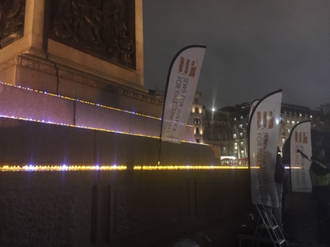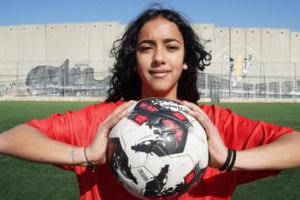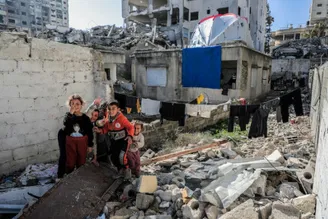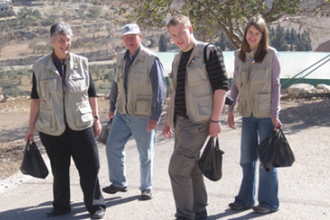Trafalgar Square: Vigil for children killed in Holy Land

Candles for 2,180 young lives lost
There was a sea of candles under Nelson's Column in Trafalgar Square on Monday night - each light representing one of the 2,028 Palestinian children and 152 Jewish children killed in the Holy Land through 50 years of Israeli Occupation from 1967- 2017.
Organised by Jews for Justice for Palestinians, for International Children's Day - there was music from Garth Hewitt, Julia Katarina, and Leah Levane in English, Arabic and Hebrew and poems read by a member of Independent Jewish Voices.
Reflections and prayers were offered by Chris Rose from the Amos Trust; Rabbi Alexandra Wright from the Liberal Jewish Synagogue in St John's Wood; Shamiul Jourdar from Friends of Al Aqsa, and Pat Gaffney from Pax Christi.
Actors Andy de la Tour and Susan Woolridge read out a list of names and ages, although there were so many, there wasn't enough time to read them all.
Pat Gaffney General Secretary of Pax Christi gave the following reflection:
Now picture this.
A young man, seemingly acting in a strange, way joins the crowd. He has a drum.
Imagine this, young people excitedly getting ready to go out to meet friends. Or waiting for family members to come home from work or travel after a long period away. Joyful anticipation, a very human experience, that probably transcends cultures, religions, time-zones. There are times however when the anticipation turns to sadness and fear.
1 June 2001. A crowd of young people, mostly from Russian-speaking families from the former Soviet Union, are waiting to get into the Dolphinarium night-club in Tel Aviv. It is a Friday night. They have dressed up. Who will they meet? Who will they see?
At a certain point the young man detonates the drum, it is full of explosives and ball-bearings, which reach out and kill 21 teenagers and four adults . Among the teenagers, nine under 18. Children.
Maria 14,
Raisa 15,
Ana 15,
Katherine, 15,
Irina 16,
Mariana 16,
Yulia 16,
Liana 16,
Marina 17.
Saeed aged 22, was the young Palestinian man who detonated himself along with the explosives.
Now picture this.
16 January 2009. Young members of a family gather in their bedroom. They are chatting, doing homework, waiting for others to return, because it has become dangerous outside. Bombs may soon be falling again. This is Gaza, January 2009 the time of Operation Cast Lead.
Suddenly shells from an aircraft of the Israeli Defence Forces hit the apartment, the bedroom is hit. Four of the young people have been killed instantly.
Three are sisters, the fourth their cousin.
Children.
Their Father.
Bessan 21
Mayar 15.
Aya 14
Noor, their cousin 17
Izzeldin Abuelaish is a doctor at a hospital in Israel, working, as he described it, as "a bridge between two worlds." That night he is home, horrified by what has happened. He called his friend Shlomi Eldar, an Israeli journalist. The call is broadcast, giving Israeli viewers a Palestinian voice on the deadly cost of war. Dr Abuelaish shared this experience, and his life story in the book: I Shall Not Hate: A Gaza Doctor's Journey. In it he wrote, "Children are hope, they are the beauty of life. They are the future."
These two stories account for just 16 years of the 50 years of occupation that we commemorate this evening. Violence has no limits and we should never allow it to become acceptable. State violence, para-military violence, terrorist violence economic violence, domestic violence, it is all unacceptable.
Neither is violence inevitable and it is our task to work to create and support the skills, the resources, the procedures, the laws, the pathways and opportunities, how and where we can, to ensure that the fear, the injustice, the anger, the failure of promises, the suspicion, that has allowed so many to die through violence be brought to an end.
In September, Christians in many countries held a Week for Peace in Palestine and Israel. The theme this year was Voices of the young, visions of the future, inspired by the prophet Joel: 'Your sons and your daughters will prophesy and your young people will see visions. The young people of Palestine and Israel have known nothing else but the tragic division created by occupation. Yet they have their own visions for a future of peace and justice.'
We tried to amplify some of these voices and messages during that week.
Here are just two.
Noa Gur Golan aged 19, a young conscientious objector, refusing to serve with the Israeli Defence Forces who says: "I think when we try to control people and justify it for security reasons we should ask ourselves: is this the right thing? Are we truly free when we control another people?"
Wadie Qaqunda, a school student from Ramallah: "Peace, and specifically just peace, is the solution to bringing security to Israel and Palestine. War won't help; there are no winners in war, only losers, and in every war the real losers are innocent civilians from both sides. Negotiating must be done eye to eye, you cannot negotiate on your knees."
Sometimes religious leaders can speak truth to power. They can create the moral crisis that creates political and social leverage and so allows something new and life-giving to emerge.
I believe Pope Francis did this in June 2014, following his visit to the Holy Land. He invited Shimon Peres and Mahmoud Abbas to Rome and addressed them with these words: "Dear Presidents, our world is a legacy bequeathed to us from past generations, but it is also on loan to us from our children: our children who are weary, worn out by conflicts and yearning for the dawn of peace, our children who plead with us to tear down the walls of enmity and to set out on the path of dialogue and peace, so that love and friendship will prevail.
Many, all too many, of those children have been innocent victims of war and violence, saplings cut down at the height of their promise. It is our duty to ensure that their sacrifice is not in vain. The memory of these children instils in us the courage of peace, the strength to persevere undaunted in dialogue, the patience to weave, day by day, an ever more robust fabric of respectful and peaceful coexistence, for the glory of God and the good of all.
Peacemaking calls for courage, much more so than warfare. It calls for the courage to say yes to encounter and no to conflict: yes to dialogue and no to violence; yes to negotiations and no to hostilities; yes to respect for agreements and no to acts of provocation; yes to sincerity and no to duplicity. All of this takes courage, it takes strength and tenacity.
We must all find this courage as we remember that, 'Children are hope, they are the beauty of life. They are the future'."
(See more pictures and films from the night on the ICN Facebook page.)


















